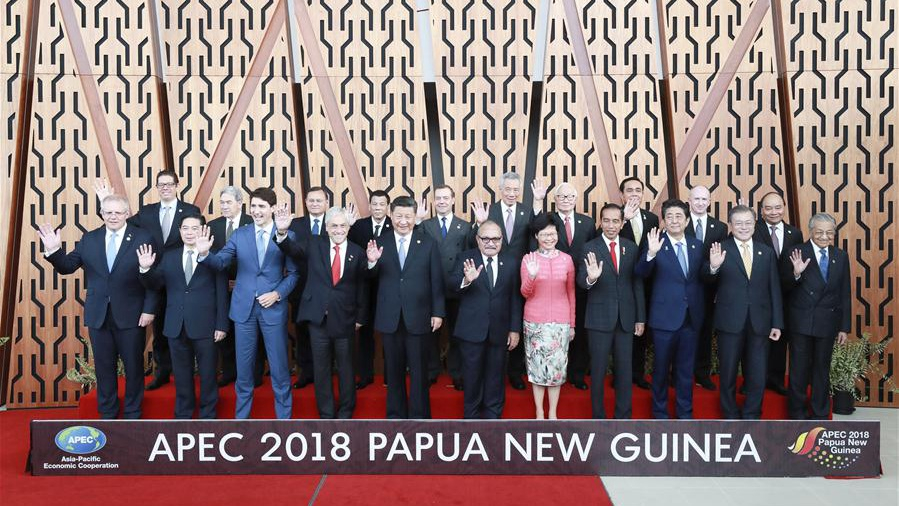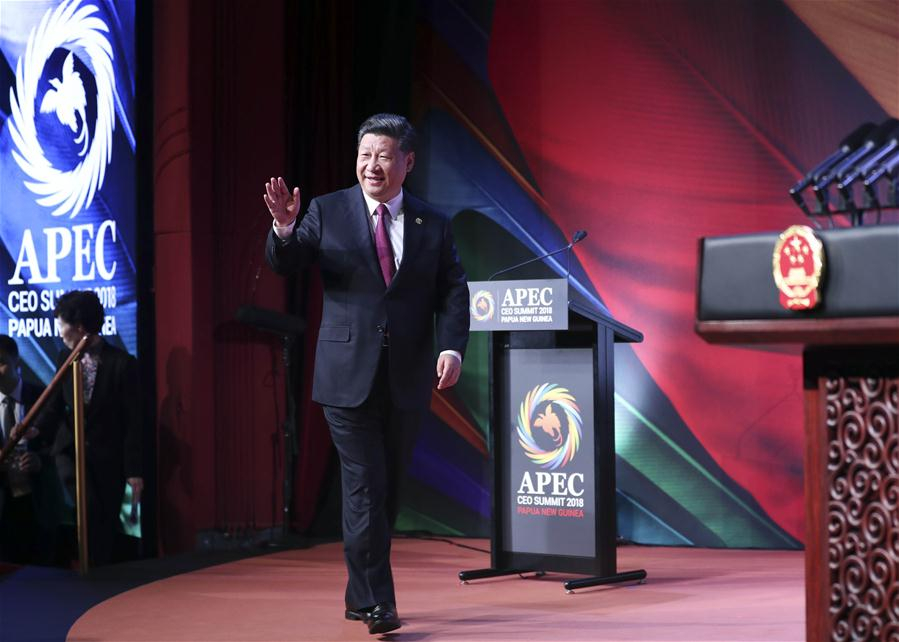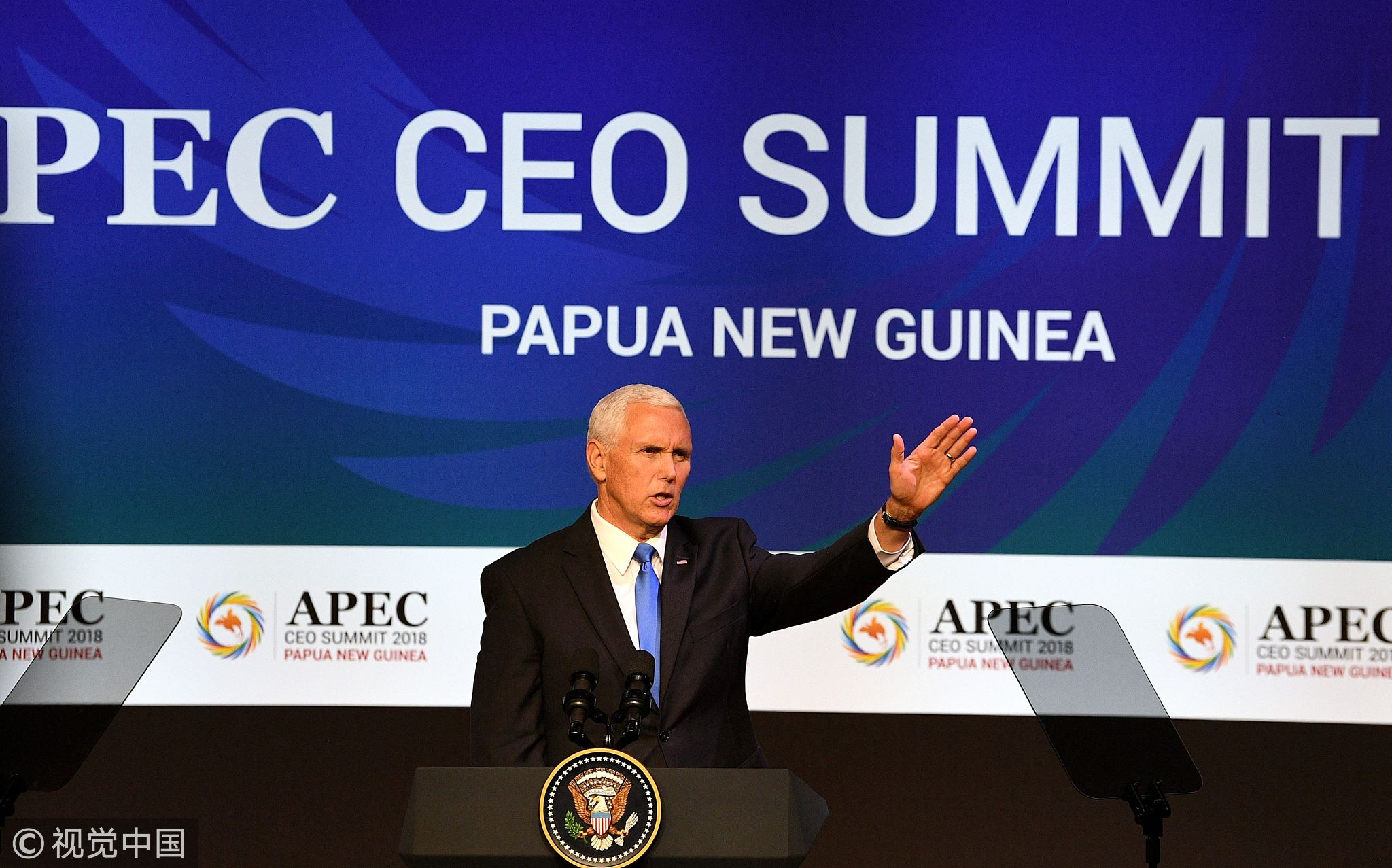
Opinions
09:45, 19-Nov-2018
Opinion: Pacific nations should not be forced to choose sides under US pressure
Updated
08:48, 22-Nov-2018
Tom Fowdy

Editor's note: Tom Fowdy is a UK-based political analyst. The article reflects the author's opinion, and not necessarily the views of CGTN.
The 2018 Asia-Pacific Economic Cooperation (APEC) Economic Leaders' Meeting in Papua New Guinea found itself overshadowed by an attempt by US Vice President Mike Pence to frame the region into a zero-sum competition between the US and China. Utilizing the Neo-McCarthyist rhetoric that has emerged in Washington, Pence sought to exacerbate fears of Beijing's policies in the region and take aim at the Belt and Road Initiative (BRI); pressuring countries to side with the US.
The anti-China discourses created by the vice president, however, serve not only to greatly misunderstand the region but also greatly undermine and limit the prospects of its success. The future of the Asia-Pacific area relies not upon rigid blocs of cold war-style confrontation between countries, but an open and earnest field of cooperation whereby its countries are not forced to “choose sides” between given parties, what is very much the geopolitical outcome this administration is hinting towards.
For all Pence has launched into a diatribe about the BRI, the nations of the Pacific view it very differently. In contrast to Washington's desire for economic warfare against Beijing, countries in the area understand the benefits of having strong economic ties with China and are largely committed to increasing such.

Chinese President Xi Jinping enters the venue of the Asia Pacific Economic Cooperation (APEC) CEO Summit in Port Moresby, Papua New Guinea, November 17, 2018. /Xinhua Photo
Chinese President Xi Jinping enters the venue of the Asia Pacific Economic Cooperation (APEC) CEO Summit in Port Moresby, Papua New Guinea, November 17, 2018. /Xinhua Photo
Such countries recognize that China's support, cooperation, and infrastructure can help boost their development and attain greater prosperity. There may be differences, negotiations, and reservations, but no country within the region has ever denied the outright benefits of the scheme.
The political reality is that China is an indispensable and intrinsic component of regional development and prosperity. For a developing country to deny such is an act of self-harm. Washington's scaremongering appears to be unable to recognize or acknowledge this and is out of touch accordingly.
Yet just because many nations, including Papua New Guinea itself, are making choices out of self-interest to economically cooperate with China, does not mean they are advocating antagonism or ill feeling toward Washington. Rather, such states do not want to be obligated to “choose sides” between the two powers. Many Asia-Pacific countries recognize that there is much to be gained by a constructive relationship between both countries and that it is only through earnest cooperation, that their position can be improved.
On this note, it is worth remembering that China's foreign policy and participation in the BRI is not forcing them to do so either. It is a longstanding tradition of Beijing's foreign policy that it does not ask any countries to make formal alliances or to outright choose between it and Washington. It has rather, always opted for a constructive, interdependent and positive relationship with the US that avoids cold war lines.

US Vice President Mike Pence delivers a keynote speech at the CEO Summit of the APEC CEO Summit in Port Moresby, November 17, 2018. /VCG Photo
US Vice President Mike Pence delivers a keynote speech at the CEO Summit of the APEC CEO Summit in Port Moresby, November 17, 2018. /VCG Photo
Therefore, it is the rhetoric of the administration and Mike Pence alone which is trying to force countries to choose sides and redraw the region in cold war lines of competition. It selfishly ignores the political reality in favor of zealous and ideological crusading which as usual, fails to respect that other countries have interests and needs which may differ from that of America.
Thus, by scaremongering about China and attempting to paint its initiatives as a form of aggression, countries who benefit from productive ties with both sides and do not want to choose sides are consequentially starting to feel uncomfortable in a geopolitical environment which now threatens their regional interests.
Without a doubt, there is a great promise of future prosperity in the Asia-Pacific. However, in the world of today this cannot be achieved by a projection of cold war-style rhetoric and geopolitical confrontation from Washington. Mike Pence's attitude was abrasive, uncompromising and patronizing. Countries must not be forced to choose alignments and should be allowed to facilitate economic ties with China if they wish to do so.
(Cover Photo: Chinese President Xi Jinping (5th L, front) and other leaders and representatives from member economies of the APEC pose for a group photo ahead of a dialogue between APEC leaders and representatives from the APEC Business Advisory Council in Port Moresby, Papua New Guinea, November 17, 2018. /Xinhua Photo)
(If you want to contribute and have specific expertise, please contact us at opinions@cgtn.com.)

SITEMAP
Copyright © 2018 CGTN. Beijing ICP prepared NO.16065310-3
Copyright © 2018 CGTN. Beijing ICP prepared NO.16065310-3